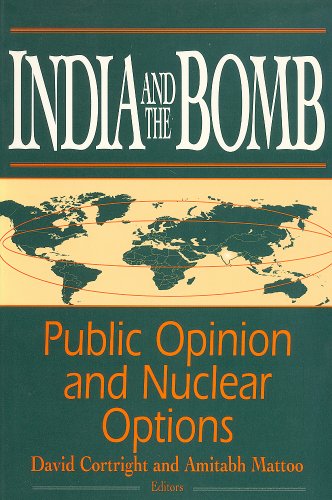David Cortright Amitabh Mattoo (3 results)
Product Type
- All Product Types
- Books (3)
- Magazines & Periodicals
- Comics
- Sheet Music
- Art, Prints & Posters
- Photographs
- Maps
-
Manuscripts &
Paper Collectibles
Condition
- All Conditions
- New
- Used
Binding
- All Bindings
- Hardcover
- Softcover (2)
Collectible Attributes
- First Edition (1)
- Signed
- Dust Jacket
- Seller-Supplied Images
- Not Printed On Demand
Seller Location
Seller Rating
-
India and the Bomb: Public Opinion and Nuclear Options (Publication of the Joan B. Kroc Institute for International Peace Studies)
Published by Univ of Notre Dame Pr, 1997
ISBN 10: 0268011761ISBN 13: 9780268011765
Seller: Project HOME Books, Philadelphia, PA, U.S.A.
Book
Condition: Good. Used - Good.
-
Indian And The Bomb : Public Opinion and Nuclear Options
Published by India Research Press
Seller: Vedams eBooks (P) Ltd, New Delhi, India
In 1994 the Joan B Kroc Institute for International Peace Studies in corporation with the Fourth Freedom Forum conducted the most comprehensive survey to date of the Indian publics attitude towards nuclear arms and in India and the Bomb the findings of that landmark survey are examined India and the Bomb provides an in-depth view of the nuclear choices facing India and all of South Asia†from nuclear abstinence to outright weaponization and uses the findings of the public opinion poll to evaluate the level of popular support for each option The survey results and the accompanying essays written by a new generation of Indian scholars introduce new voices into the debate on nuclear policy and thereby help to democratize the discussion of India?s nuclear options South Asia area specialists international relations scholars and nuclear proliferation experts will appreciate India and the Bomb for its fresh approach and innovative methodology in addressing this vital issue of international security 176 pp.
-
India and the Bomb; Public Opinion and Nuclear Options
Published by University of Notre Dame Press, Notre Dame, IN, 1996
ISBN 10: 0268011761ISBN 13: 9780268011765
Seller: Ground Zero Books, Ltd., Silver Spring, MD, U.S.A.
Book First Edition
Trade paperback. Condition: Very good. Presumed First Edition, First printing. xiii, [3], 160 pages. Inscribed and dated by one of the editors (David Cortright). Inscription reads: Bob and Caryn: Greetings. My latest! I hope you are well. Love, David. Preface by Raimo Vayrynen. Includes Tables, Figures, Acknowledgment, About the Contributors, Bibliography, and Index. Also includes Map of India,Indian Nuclear Policy Options: Indian Public Opinion and Nuclear Weapons Policy; Abstaining: The Nonnuclear Option; Status Quo: Maintaining Nuclear Ambiguity; Freeze: Halting the Testing and Development of Nuclear Weapons; Going Nuclear: Establishing an Overt Nuclear Weapons Capability. Also contains Appendices: An Analysis of the Kroc Institute Survey; Complete Results and Tabular Data of the Kroc Institute Opinion Survey, and MARG Survey Questions, Bibliography, and Index. David Cortright is an American scholar and peace activist. He is Director of Policy Studies at the Kroc Institute for International Peace Studies at the University of Notre Dame and Chair of the Board of the Fourth Freedom Forum.[1] Cortright has a long history of public advocacy for disarmament and the prevention of war. In 1977, Cortright was named the executive director of The Committee for a SANE Nuclear Policy (SANE), which under his direction became the largest disarmament organization in the U.S. Cortright initiated the 1987 merger of SANE and the Nuclear Weapons Freeze Campaign and served for a time as co-director of the merged organization. Amitabh Mattoo (born 26 June 1962, Srinagar) is one of India's leading thinkers and writers on international relations. He was awarded a Padma Shri by the Government of India in 2009. He is Professor of Disarmament Studies at Jawaharlal Nehru University. Mattoo's advice on policy matters has been sought across political parties and across governments, including by Prime Ministers Atal Behari Vajpayee and Dr. Manmohan Singh. In 1994 the Joan B. Kroc Institute for International Peace Studies, in cooperation with the Fourth Freedom Forum, conducted the most comprehensive survey to date of the Indian public's attitude toward nuclear arms. In this context India is intriguing case. It distinguishes itself from other threshold countries by having time-honored democratic traditions, strong mass media, and active public opinion, all contributing to a rather high degree of openness in society. Yet, most Indians feel that the established nuclear powers have appropriated an undue amount of political international influence through their nuclear weapons status. This book examines the findings of that landmark survey. This book provides an in-depth view of the nuclear choices currently facing India and all of South Asia--from nuclear abstinence to outright weaponization--and uses the findings of the public opinion poll to evaluate the level of popular support for each option. The survey results and the accompanying essays, written by a new generation of Indian scholars, introduce new voices into the debate on nuclear policy, and thereby help to democratize the discussion of India's nuclear option.



